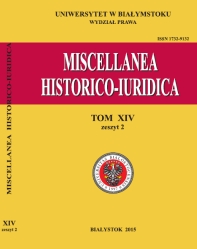Praca więźniów w okresie międzywojennym – dolegliwość czy środek celowego oddziaływania
Prisoners’ Work in the Interbellum Period – a Pain or a Measure of Intentional Influence
Author(s): Grażyna B. SzczygiełSubject(s): History, Law, Constitution, Jurisprudence, History of Law, Criminal Law, Interwar Period (1920 - 1939)
Published by: Wydawnictwo Uniwersytetu w Białymstoku
Keywords: penalty of imprisonment; penitentiary system; prisoners’ work; Polish Second Republic
Summary/Abstract: As the history of the penal system demonstrates, work performed by prisoners is an indispensable element of the process of serving a prison sentence. The concept of prisoners’ work was significantly influenced by the definition of the objectives of the penalty. At the turn of the 19th and 20th century, with a new approach to penalization, new objectives were set for prisoners’ work: instead of causing pain to the offenders, helping them return to the society became the objective of the penitentiary influence and work became one of its measures. In that period, one of the tasks of the independent Polish state was to establish the Polish penitentiary system. The task was important because, after the period of partitions, Poland had legal systems based on outdated principles of repressive and retaliatory enforcement of penalties and on forced labor, often performed in inhumane conditions, where work increased the pain of the sentence. The purpose of the analysis of the legal provisions is to demonstrate the formation of the concept of prisoners’ work.
Journal: Miscellanea Historico-Iuridica
- Issue Year: 14/2015
- Issue No: 2
- Page Range: 297-310
- Page Count: 14
- Language: Polish

